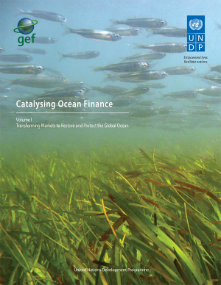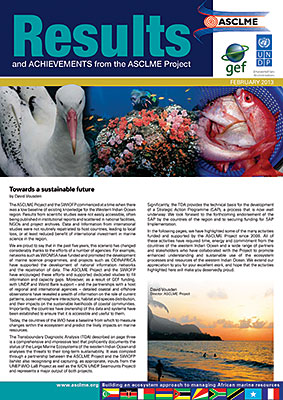Catalysing Ocean Finance
 The United Nations Development Programme (UNDP) in collaboration with the Global Environment Facility (GEF) launched the book "CATALYSING OCEAN FINANCE" on 14th December 2012 in Washington D.C. Drawing on 20 years of research and experience, Catalysing Ocean Finance demonstrates in two volumes how a modest investment of public finance, in the order of $5 billion over the next 10-20 years, can scale up proven ocean planning and policy tools, leverage financial flows, transform ocean markets, and reverse the global decline in ocean health. This book demonstrates that, far from being an intractable problem, sustainable ocean management could become a successful legacy of today's generation of decision-makers.
The United Nations Development Programme (UNDP) in collaboration with the Global Environment Facility (GEF) launched the book "CATALYSING OCEAN FINANCE" on 14th December 2012 in Washington D.C. Drawing on 20 years of research and experience, Catalysing Ocean Finance demonstrates in two volumes how a modest investment of public finance, in the order of $5 billion over the next 10-20 years, can scale up proven ocean planning and policy tools, leverage financial flows, transform ocean markets, and reverse the global decline in ocean health. This book demonstrates that, far from being an intractable problem, sustainable ocean management could become a successful legacy of today's generation of decision-makers.
To illustrate the application of market transformation instruments to promote sustainable coastal and marine resource development, the book features six case studies, drawn from the portfolio of International Waters projects financially supported by the GEF and implemented by UNDP in 31 of the world’s most important trans¬boundary marine and freshwater ecosystems.. These six are: (i) Black Sea and the Danube River Basin; (ii) Yellow Sea Large Marine Ecosystem; (iii) Rio de la Plata and its Maritime Front; (iv) Seas of East Asia; (v) West and Central Pacific Fisheries; and (vi) Global Ballast Water Programme.
The world's oceans are known to provide trillions of dollars in goods and services every year; however, many ocean ecosystems are in steep decline because of pollution, overexploitation, habitat loss, invasive species, and climate change. Without concerted near-term effort, the damage may become irreversible and consequently reverse the progress made so far in achieving sustainable development.
Although not included in the book as case studies, in Africa, UNDP supports most of coastal states in sub-Saharan Africa whose economy and development depend upon fisheries and other marine resources. UNDP-GEF supports the following four (out of five) Large Marine Ecosystems (LMEs) along the African continent: Agulhas and Somali Current LMEs, Benguela Current LME, and Guinea Current LME. Strategic Action Programmes developed for each of those African LMEs will 1) promote key policy reforms, 2) strengthen joint management of the marine resources, and 3) catalyse and direct investments from both public and private. The next set of case studies for Catalyzing Ocean Finance will most likely be developed from the LMEs in Africa.
Members of the ASCLME Project are strongly encouraged to download the two volumes and consider how the "lessons learned" can be applied to implementing the joint ASCLME/SWIOFP Strategic Action Programme, and particularly, how long term sustainable partnerships can leverage continued support for SAP Implementation, both during a GEF-funded SAP Implementation Project and far beyond.
The electronic version can be downloaded from the GEF website here. An overview of the book was given at the 6th Project Steering Committee Meeting in February 2013; the PDF of that presentation is available here.
ASCLME Highlights Report
 The UNDP supported GEF financed ASCLME Project is pleased to present our "Results and Achievements from the ASCLME Project" publication.
The UNDP supported GEF financed ASCLME Project is pleased to present our "Results and Achievements from the ASCLME Project" publication.
The report is available as a downloadable PDF or in an e-reader format (full screen PDF) and highlights the work the Project has undertaken over the past five or so years, and the great advances made by the countries with the support of many project partners in implementing an ecosystem approach to managing African marine resources.
Sister project SWIOFP has a similar publication which is available here, and provides more insights into how the two projects have worked together to achieve their goals.
The publications are in both English and French.
ASCLME Joins AfriCOG
Today the Agulhas and Somali Current Large Marine Ecosystems (ASCLME) Project joined 17 other organisations in forming an African Centre for Capacity Development in Ocean Governance (AfriCOG).
Together they will ensure that African nations are equipped with the personnel and scientific information they need to meet their national and international obligations to support sustainable development, safeguard the marine and coastal environment and ensure maximum benefits are derived from the goods and services offered by the oceans to sustain their people and economies.

Dr. David Vousden, AfriCOG’s Interim Coordinator and Director of the UNDP supported GEF financed Agulhas and Somali Current Large Marine Ecosystems Project said that “AfriCOG represents a rare opportunity for organisations across Africa to join together in creating integrated learning and capacity-building programmes and in fostering research links, ongoing research programmes and ensuring sound management advice for managers and decision-makers”. With regard to the need for a body like AfriCOG, he noted that this was important “because it is clear from all the ocean governance initiatives undertaken over the past decade or two that effective management of the oceans and marine ecosystems is not achievable – particularly in Africa – until we can strengthen capacity across many sectors, including research, monitoring, prediction, translation in to policy and management advice and actually carrying out management, compliance and enforcement activities.”
Considering the importance of capacity building, Dr. Vousden said “Training is a vital part of this, and can take place at both institutional and personal levels. Institutional training is vital as many organisations recognise the need for this type of training but are not sure how to proceed, or lack the expertise needed to create sound training programmes. Ensuring institutional training, rather than just training individuals is vital, because as people become more trained, they are often lost from research into more lucrative - but usually unrelated - government or private sector employment opportunities. Making certain that ongoing training programmes exist and creating sustainable employment opportunities for trained individuals is vital to ensuring we’re able to meet the information needs resource managers and policy makers have, and in creating rewarding and fulfilling careers and research for marine and coastal governance experts. The partners in AfriCOG recognise these challenges and will work together and leverage international support to meet them head on”.
The initiative enjoys strong regional and international support.
Mr. Sloans Chimatiro, Senior Fisheries Advisor of the NEPAD Planning and Coordination Agency noted that “NEPAD is very pleased to see this important Pan-African initiative for capacity building and training moving ahead in its development through this foundational signatory process” and that AfriCOG “could support the African Union Commission and NEPAD in delivering a Pan-African Fisheries Policy Framework and Reform Strategy”.
The UNDP’s Head of Water and Ocean Governance Programme, Andrew Hudson, said that “Millions of people in Africa are directly dependent on coastal and marine resources for their well-being and food security. These coastal communities are also highly vulnerable to economic, climatic and social change”. He further elaborated that AfriCOG would “develop experience and resource networks that build capacity for pro-poor growth and human development; piloting and replication of new management approaches and best practices; institutional level rather than just individual training; and the overall promotion of science, technology and innovation as important drivers of growth and sustainable development”.
Wendy Watson-Wright, Executive Secretary of the Intergovernmental Oceanographic Commission and Assistant Director-General of UNESCO congratulated the partners and expressed their support for the initiative. “It is with considerable interest and strong enthusiasm that we at the Intergovernmental Oceanographic Commission of UNESCO take note of today’s important proceedings and this landmark signature by the founding institutions to establish and develop an African Centre for Capacity-Building and Ocean Governance. IOC-UNESCO now looks forward to seeing AfriCOG grow and expand to include more academic and research institutes throughout the continent of Africa and its island states, thereby strengthening its remit to be truly pan-African in its outreach and forging ever stronger partnerships throughout the region and, indeed, throughout the world”.
Indeed, partnerships and cooperation are the cornerstones of AfriCOG, which recognises that considerable expertise exists within the region, but that it needs to be better coordinated, ensure long-term institutional capacity is maintained, and build scientific consensus and management advice to advance the sustainable management of marine and coastal resources throughout Africa. AfriCOG’s partner organisations will support not only training but also ongoing research to answer key research questions that affect the people and economies of the regions, most notably around the effects of climate change, ecosystem variability, trends and patterns and ecosystems goods and services.
The 18 founding partners include the University of Fort Hare, Nelson Mandela Metropolitan University, Rhodes University, University of Cape Town, Department of Aquatic Sciences and Fisheries of the University of Dar es Salaam, University of Namibia, World Maritime University, International Ocean Institute, Benguela Current Commission, Oceanographic Research Institute, the NRF’s South African Environmental Observation Network and South African Institute for Aquatic Biodiversity, South African National Biodiversity Institute, Bayworld Centre for Research and Education, Nelson Mandela Bay Maritime Cluster, International Union for Conservation of Nature, GEF International Waters Learning Exchange and Resource Network and the GEF financed UNDP supported Agulhas and Somali Current Large Marine Ecosystems Project.
The signature ceremony was conducted at the iconic seafront Winchester Mansions Hotel in Sea Point, Cape Town.
About AfriCOG
The African Centre for Capacity Development in Ocean Governance (AfriCOG) seeks to foster partnerships and support for training and strengthening Pan-African capacity and skills in Marine Resource Management and Ocean Governance and to enhance and encourage the use of trained human resources in the sustainable management and use of coastal and marine goods and services for the long-term security and welfare of associated countries and communities.



